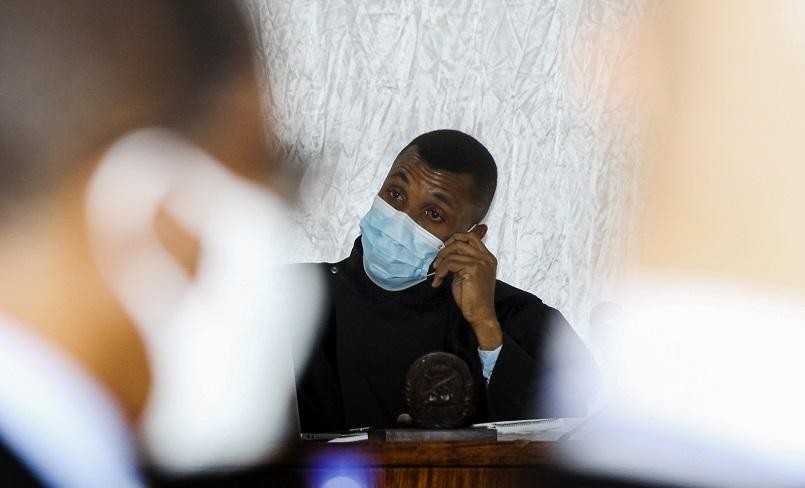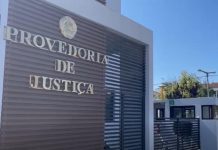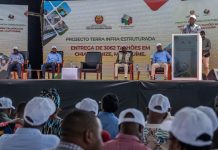Africa-Press – Mozambique. Two witnesses in the trial of 19 people before the Maputo City Court, on charges arising from Mozambique’s “hidden debts” scandal, on Monday said they had no idea of a scheme to set up an integrated monitoring and protection system (SIMP) for Mozambique’s Exclusive Economic Zone, of which the three fraudulent companies, Proindicus, Ematum (Mozambique Tuna Company) and MAM (Mozambique Asset Management) were supposed to be part.
Victor Bernardo, Deputy Minister of Development and Planning under former President Armando Guebuza, recalled that he had been called to a meeting in the Defence Ministry in December 2012 and told of plans to set up a new company to boost protection of the Exclusive Economic Zone. That company would become Proindicus.
Bernardo was invited to the meeting because he was chairperson of Monte Binga, a company owned by the Defence Ministry, which would become one of the two shareholders in Proindicus. The other was GIPS, a company run by the Security and Intelligence Service (SISE). Bernardo said it was SISE that had drawn up the plans for Proindicus.
Bernardo said he had never heard of SIMP, or of any plan to link Proindicus with two other companies. He only heard about Ematum and MAM through the press.
Yet, in his testimony last month, the former SISE director of economic intelligence, Antonio do Rosario, had claimed that SIMP was a vital piece ion the national security architecture. Yet, just as last Friday a SISE national director, Joia Haquirene, said he had never heard of SIMP, here was a former member of the government who knew nothing about it either.
Nor did he seem to know who Antonio do Rosario was. Rosario claimed to be the coordinator of SIMP – yet the SISE agent whom Bernardo mentioned was Teofilo Nhangumele, a man whom Rosario repeatedly denied had anything to do with the maritime protection projects.
Athough Nhangumele had no formal position in SISE, or in any of the other defence and security forces, he had been present in the December 2012 meeting in the Defence Ministry. Bernardo said he regarded Nhangumele as “a representative of SISE”.
Nhangumele called him to a meeting to discuss Monte Binga’s role in setting up Proindicus. “Someone from the Middle East was also present”, Bernardo said – this was certainly a representative of the Abu Dhabi based group Privinvest, which became the sole contractor for Proindicus, Ematum and MAM.
The scheme for protecting the Exclusive Economic Zone required equipment, which in turn needed finance. Bernardo recalled insisting that any loan for this purpose must be highly concessional, with a low interest rate and a long repayment period. But instead, the bank Credit Suisse was insisting on a commercial loan.
A loan document was put in front of him, “But I told Teofilo Nhangumele I could not sign, because I had no information on the debt ratios”, Bernardo said. When the document came back, it was signed by a Privinvest representative, and by the National Director of the Treasury, Isaltina Lucas. Bernardo now thought he had no option but to sign the document, in the name of Proindicus.
Bernardo’s version of events backs up the claims made by Nhangumele that he had fronted the original negotiations with Privinvest in late 2011, and had taken a Mozambican delegation, including Ndambi Guebuza, oldest son of the President, to visit Privinvest facilities in Germany and Abu Dhabi.
It utterly contradicts Rosario’s version, which wrote Nhangumele and his group out of the picture altogether.
When he first mentioned Nhangumele’s name, the judge, Efigenio Baptista, asked Bernardo to point out Nhangumele in the courtroom. He did so unfailingly, with the friendly greeting “Hallo, Teofilo!”
A second witness who contradicted Rosario was Eugenio Matlaba, a former Defence Ministry official who became the first Chairperson of the Proindicus board (from February 2013 to February 2014, when Rosario took over).
He recognized that there was a scheme called SIMP, but it was nothing like the junction of three companies claimed by Rosario. “As Chairperson of Proindicus, I never heard of this”, he said.
The SIMP he knew of was just an expanded version of Proindicus which would protect not only the maritime border, but the terrestrial, lake and river borders too, The loan from Credit Suisse (which grew to 622 million US dollars) was used to greatly increase the number of patrol vessels acquired from Privinvest.
But this version of SIMP did not involve any other companies. There was no mention of Ematum or MAM. Indeed, Matlaba believed that Proindicus was already “an integrated project”, and the Proindicus assets were sufficient for this version of SIMP.
Matlaba said Proindicus was not intended to replace the Mozambican navy. It was intended to sell its security services to hydrocarbon companies operating in the Mozambique Channel, fishing fleets, merchant shipping and tourism boats. But by the time Matlaba left the company in February 2014, not a single contract had been signed with any of these undertakings.
For More News And Analysis About Mozambique Follow Africa-Press






